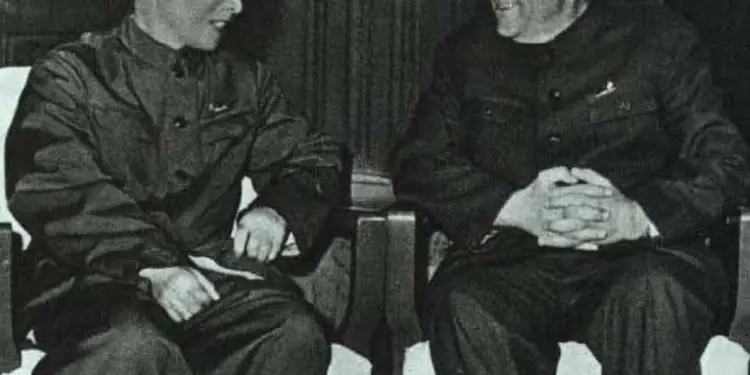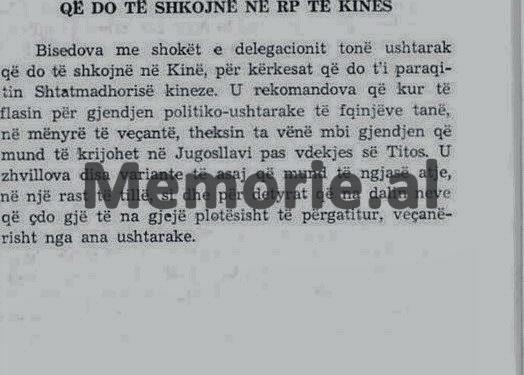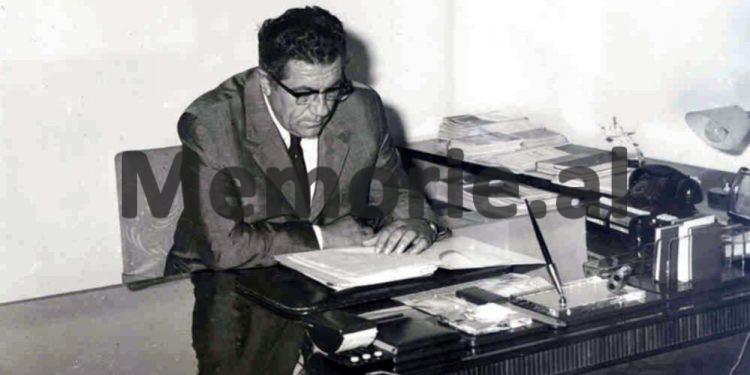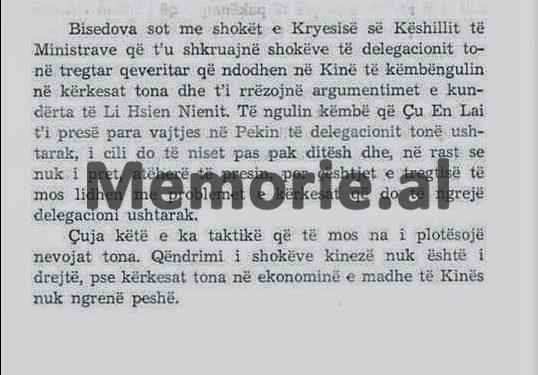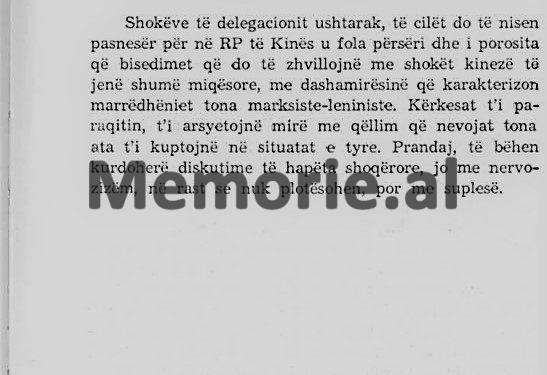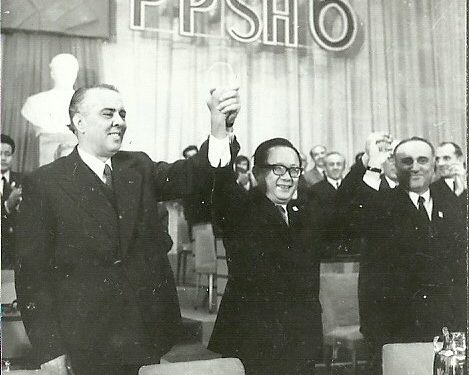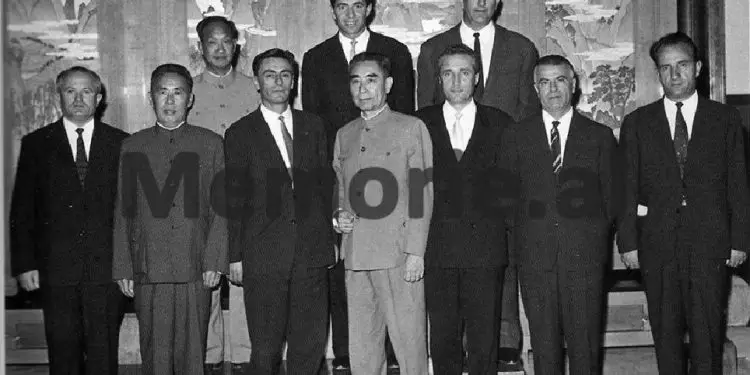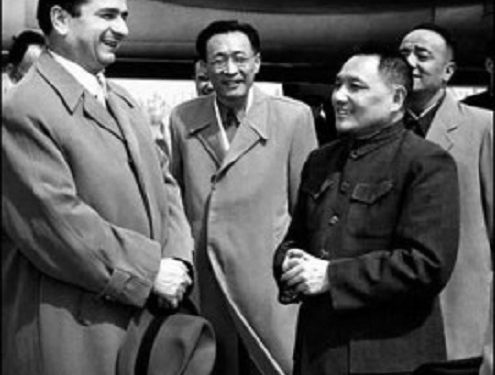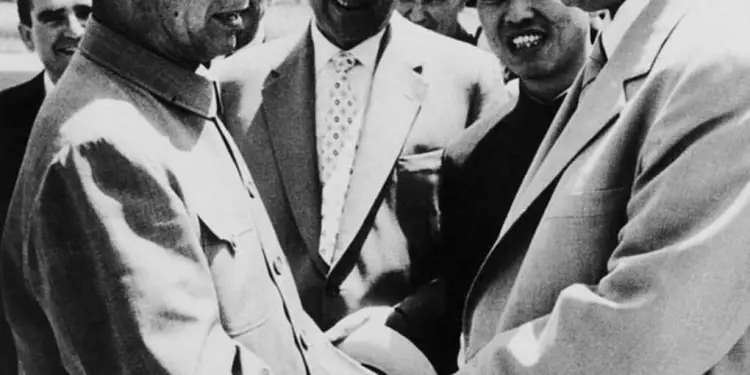Dashnor Kaloçi
Memorie.al publishes some archival documents extracted from the Central State Archive in Tirana (the fund of the former Central Committee of the ALP and the personal fund of Enver Hoxha), where is the political diary of Enver Hoxha that he kept in the period October December 1972, when a large military delegation of the Ministry of Defense headed by Minister Beqir Balluku (attended by all directors of directorates and chiefs of all types of weapons), left for the People’s Republic of China, where according to orders given by Enver himself before the departure, they would ask the senior Chinese leadership to help the Albanian army, equipping it with combat equipment, as the Albanian army still had in use, World War II weapons, which had been given to them by the Soviet Union since 1955. The complete diary of Enver Hoxha regarding the military delegation headed by Minister Balluku, starting from their talks with Prime Minister Chu En Lai and leader other senior party and state figures of the People’s Republic of China, where he after expressing his reservations and dissatisfaction to China’s top leaders, starting with Mao Zedong, Chu En Lai, etc., accusing them of incompetence in the leadership of the party and the whole country, casts doubt on the physical elimination of the Minister of People’s Defense of China, Lin Biao, considering untrue the accusations of Chu En Lai, who told the Albanian delegation that Lin Biao had brought major damage to the Communist Party of China and the Chinese government. Enver Hoxha’s dissatisfaction with the Minister of Defense, Beqir Balluku, who would not return to Albania immediately, but had postponed the date of his return to Tirana for another two weeks, after he had decided to stay in Rome and Paris, with the whole delegation that accompanied him!
Enver Hoxha’s political diary for the visit of the high military delegation headed by Beqir Balluku, in the People’s Republic of China, in October 1972
WEDNESDAY 25 OCTOBER 1972
TALKS WITH THE FRIENDS OF THE MILITARY DELEGATION THAT WILL GO TO THE PRINCE OF CHINA
I talked to the comrades of our military delegation that will go to China, about the requests that will be submitted to the Chinese General Staff. I was advised that when talking about the political-military situation of our neighbors, in particular, emphasize the situation that may arise in Yugoslavia after the death of Tito. I developed several variants of what might look like there, in such a case, as well as the tasks that come our way to get everything fully prepared, especially militarily.
SUNDAY
OCTOBER 29, 1972
INSTRUCTIONS FOR OUR GOVERNMENT TRADE DELEGATION LOCATED IN BEIJING
I spoke today with the comrades of the Presidency of the Council of Ministers to write to the comrades of our government trade delegation located in China to insist on our demands and refute Li Hsien Nien’s opposing arguments. Insist that Chu En Lai, wait for them before the departure of our military delegation to Beijing, which will leave in a few days and, in case you do not expect them, then wait, but trade issues, not related with the problems and demands that the military delegation will raise. Chua has this tactic of not meeting our needs. The attitude of our Chinese comrades is not right, why our demands on China’s large economy do not carry weight.
THURSDAY NOVEMBER 2, 1972
TO BE VERY FRIENDLY AND LOVING IN TALKS WITH CHINESE FRIENDS
I spoke again to the comrades of the military delegation, who will leave for the People’s Republic of China the day after tomorrow, and instructed them that the talks they would hold with their Chinese comrades be very friendly, with the kindness that characterizes our Marxist-Leninist relations. Ask for requests; justify them in order for them to understand our needs in their situations. Therefore, always have open social discussions, not with nervousness, in case they are not met, but with supplements.
EVE NOVEMBER 6, 1972
OUR DELEGATION ARRIVED IN BEIJING
Our military delegation arrived in Beijing and was warmly received by Jeh Chen Ji and a large number of senior officers. Li Hsien Nieni had also appeared.
FRIDAY NOVEMBER 10, 1972
ÇU EN LAI RECEIVES OUR TWO DELEGATIONS IN BEIJING
Comrade Chu En Lai received the comrades of our military delegation and the government trade delegation and had a 4-hour conversation with them. He will talk to the comrades of the military delegation again before he returns. The comrades of the trade delegation were given the amount of grain they asked for, but “with a laugh”, Çuja said that “you sent me an ultimatum to meet with you and you called me a bureaucrat”. Our friends lack tact in requests and remember that they have to come up with their own, how they want and when they want! These are indecent attitudes for us, which put us in difficult positions with friends and for some things we have no right to insist on with a mule attitude. We must keep in mind that Chu En Lai does not just have our issues to resolve. Sometimes this thing is forgotten.
EIN 13 NOVEMBER 1972
NOTE
The comrades of our military delegation in Beijing informed us of the official opinion of the Chinese comrades on the negotiations being carried out by South Vietnam with the Americans. These thoughts coincide with ours. My thoughts on this issue, which I expressed to the Chinese youth delegate, made them also tell us their thoughts.
WEDNESDAY NOVEMBER 15, 1972
NOTE
Yesterday our trade delegation returned from China. I was informed about the results of the talks.
VLORE, SUNDAY 10 DECEMBER 1972
MISSING POLITICAL SENSE
Beqir Balluku, who came from Beijing to Paris, as my friends tell me, will not return by plane on Tuesday from Rome, but has requested that our plane be in Bari on Saturday, December 16th. Apparently, he wants to stay in Paris and Rome, together with all the friends who accompany him. Politically, what Beqiri is doing is not fair at all. Until Saturday they tell him 10 days that he has left China, so after 10 days, we will announce that he has returned home, which does not go at all. The Minister of Defense roams the streets just to walk, and in unfriendly places. In addition, his friends buried his mother when he was not here, but even for this reason it is not too late for him to return to Albania as soon as possible. Kids, too, expect it. There is no way to understand such a thing, but his frivolity and lack of political sense. We made this criticism of him once again, when he wanted to do the same thing.
VLORE, SUNDAY 17 DECEMBER 1972
READING THE PROCESS-MINUTE F. A CONVERSATION BROUGHT TO LAIT
Reading the minutes kept by our comrades of the military delegation, in their conversation with Chu En Lain in Beijing, we can draw some conclusions: At length and mainly in this conversation, Chu En Lai addressed the problems of China’s foreign policy, some key aspects of it, internal problems and, in the first place, or in the realizations, they put at the expense of the sabotage made by Lin Biaoja. This is, so to speak, the main topic of conversation that Chu En Lai had and which, in essence, I will talk about below. Chu En Lai’s picture of foreign policy problems was not something “brilliant”, no matter how long it spun. At first, when I read the minutes, I had the impression that he was talking about our friends, but in fact he was also talking about the gallery, about the Chinese friends he had invited to that meeting.
The problems he raised were familiar to us, but the interior had neither any originality nor the prospect of China’s international politics, in all its breadth. These were the common and well-known positions of us at the UN on a range of issues, raised by others, and on which China must take a stand. The objective of this stance is to “oppose and expose” Soviet attitudes that “deceive and lie to others.” This is good, but no active political action is taken by China to draw attention to the UN, to actually draw “neutrals” from Soviet influence, and to make these “neutrals” feel warm, feeling to China. a strong and true supporter. Not only that, but in Chu En Lait’s speech, it does not appear that a plan of work and problems has been devised, to disturb the enemies the comfortable status quo created in the UN and not to be forced to accept their law.
I think it is not enough just to say, like Chu En Lai, that “we will fight even if we just stay in the UN, because we fight for justice.” This is right, but while we are fighting for justice, many others must support us, and these many others will not support us, if we do not support them, and not just “giving credit”, because so do the imperialists and social imperialists, but ruthlessly unmasking these two superpowers, which China is currently not doing properly and adequately. Small peoples want the superpowers to be unmasked and hindered in their activity. You were making concessions to the superpowers, you were showing nuances and preferences in relations with them, ostensibly to balance or to counterbalance, then you lost the interest and trust of the people towards you, that they see that such acrobatics are done every day by the governments of the countries them to escape the nails of the great.
They pay particular attention to China’s attitudes, because they consider it a powerful socialist state. China publicly shows that there are nuances in its foreign policy, at least in propaganda against the Soviet Union and the United States. Chu En Lai also said that “we owe more to the Soviets, because they cheat more, that they are removed as socialists, while the American imperialists are unmasked as such.” Such a thing is, and is not true, but to declare this and make distinctions in practice is not right, because in this way both superpowers will fight with the weapon he gives himself. “Soviet revisionists, on this occasion, say that ‘China is against socialism,’ joins American policy.” And in fact, the very differentiation she makes today worldwide, saying that the number one enemy is the Soviet Union and then come the United States of America, leads her to the side of the latter. Memorie.al
The next issue follows




